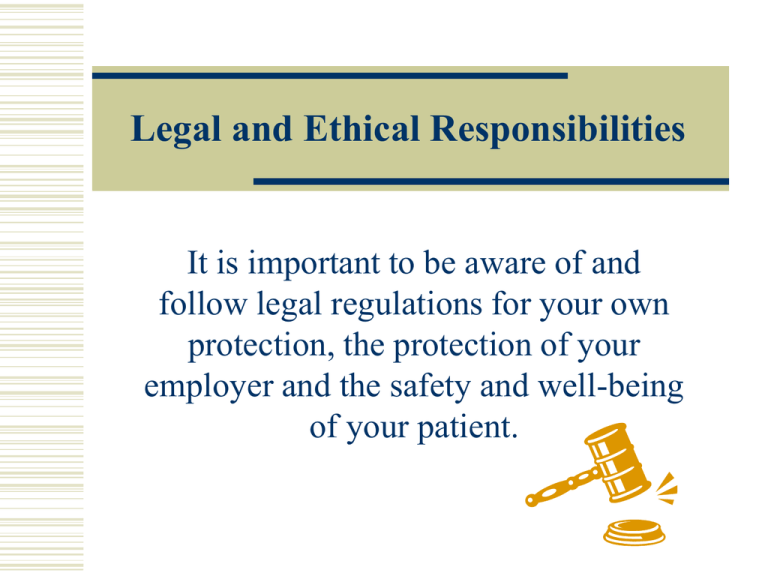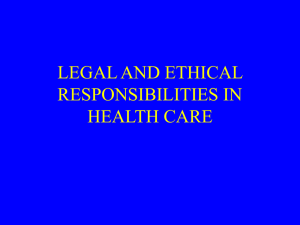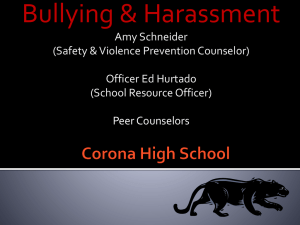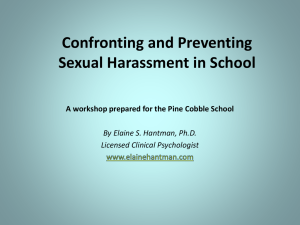
Legal and Ethical Responsibilities
It is important to be aware of and
follow legal regulations for your own
protection, the protection of your
employer and the safety and well-being
of your patient.
Standards
HS-IHS-6
Demonstrate an understanding of the legal responsibilities, limitations,
and implications of their actions within the healthcare delivery setting.
Evaluate the importance of their duties according to regulations, policies,
laws and legislated rights of clients.
6.1 Analyze the basic legal responsibilities of healthcare workers in
regards to torts, malpractice, and negligence, invasion of privacy,
privileged communication, patient/client confidentiality, and informed
consent.
6.2 Discuss patients’ rights and responsibilities.
6.3 Explain standards for Health Insurance Portability and
Accountability Act (HIPAA).
6.4 Describe advance directives.
6.5 Evaluate the importance of institutional policies and procedures.
Legal responsibilities are those that
are authorized or based on law.
Criminal law
focuses on wrongs
against a person,
property, or
society
Civil law
relationships between
people and the protection
of a person’s rights
Healthcare is mainly
affected by civil law
Torts
wrongful acts that do
not involve contracts
Torts
Malpractice
Negligence
Assault and Battery
Invasion of Privacy
Defamation
slander
libel
Abuse
physical
verbal
psychological
sexual
False Imprisonment
Torts
Malpractice:
Licensed professional
fails to provide services
as per the standards set by
the governing body
subsequently causing
harm to the patient.
bad practice
professional negligence
Professional person (Doctor
or nurse) commits
malpractice
Doing
or Saying Nothing
When Action Is Required
Improper
Administration of
Medication
Leaving
a pair of forceps in a
patient’s surgical incision
Torts
Negligence:
Failure to give care that
is normally expected,
causing unintentional
harm to your patient
Harm caused by
carelessness
Usually NonProfessional or NonLicensed persons are
liable for negligence
(CNA)
Not checking the temp of
the bath water, burning
your patient
Not turning your patient
and they develop pressure
ulcers
Torts
Assault
A threat or an attempt
to injure
Threatening harm if
patient doesn’t comply
with wishes
Issuing threats of harm
Battery
Unlawful touching of
another person
Providing First Aid
without permission
Surgery without
consent
Performing a procedure
to a patient when they
said “no”
Torts
False Imprisonment
Restraining a
person or
restricting their
freedom
Closing the door
Taking away a
patient’s call bell
Using restraints
without proper
orders
Abuse
physical, mental harm or
anguish causing harm to a
patient
Can be
Sexual
Rape, touching in sexual
way
Psychological
Making patient’s fear you
Verbal abuse
Yelling, name calling
Torts
Invasion of Privacy
Exposure of a patient
either personally or of
their records
Entering room without
knocking
Looking at a patient’s
record when you don’t need
to
Sending information to
someone about a patient
without patient’s
permission
Defamation
False statements made
about a person that
damages their reputation
libel is a written false
statement
slander is a spoken false
statement
Passing along information
that is untrue (gossip) can
also be defamation
HIPAA
Health Insurance Portability and
Accountability Act
Federal protection for privacy of health
information in all states.
The Health Insurance Portability and
Accountability Act of 1996 (HIPAA)
Privacy Rule
Patients must sign HIPAA consent form for
health care provider.
HIPAA
Only exception to confidentiality rules is
information that must be reported by law to
protect the safety and welfare of the public.
Births and deaths
Injuries caused by violence that require police
involvement
Communicable diseases
Sexually transmitted diseases
HIPAA
1. What federal department regulates HIPAA?
2. Must a patient sign a HIPAA authorization form before
his/her physician’s office files an insurance claim for the
patient?
3. Can a physician give a son confidential information about
his father’s condition without the father’s written consent?
4. Karen wants a copy of her dental x-rays. Can the dental
office charge her $10 to provide her with a copy?
5. Brenda has a baby but does NOT want the information
made public. Can she refuse to have the birth registered?
Contracts
Implied contracts are those obligations that
are understood without verbally expressed
terms
RN gives a
medication to a pt.
He implies acceptance
of the treatment by
taking it
Contracts
Expressed contracts
are stated in distinct
and clear language,
either orally or written
Usually related to more
invasive procedures
where discussion needs
to take place
A surgery permit
that a pt signs before
having an operation
Informed Consent
Informed consent is permission granted voluntarily
by a person who is of sound mind after the procedure
and all risks have been explained in terms the person
can understand.
Can be verbal, but for most procedures
should be in writing.
Person can withdraw consent at any time.
Procedures should not be performed
patient does not give consent.
Consent
Form
if the
it
Three parts of a contract are:
Offer: competent person
Contracts are
offers to be a patient
agreements between
Acceptance: provider
2 or more parties
agrees to see/treat
Role of the agent
patient
must always be
Consideration: patient
defined
Agrees to pay for treat
The Role of the Agent
When working in healthcare you are working
under a contract.
You are the Agent
Your employer is the Principal
The Principal is responsible for the actions of the
Agent and can be required to pay or compensate
people for actions that an agent does that causes harm
If you make a mistake, it is not just you that gets in
trouble…your place of work does as well.
Legal Disability
All parties must be free of legal disability
Minors
Mentally incompetent persons
Under the influence of drugs or alcohol
Unconscious persons
These persons must have a court appointed
guardian
Communication barriers can cause someone to have a legal
disability and a translator is required to explain contract to
non-English speaking person, deaf or hearing impaired
Advance Directives
Living Wills
Documents that allow
individuals to state
what measures should
or should not be taken
to prolong life when
their conditions are
terminal
Durable Power of
Attorney
Document that permits
an individual to appoint
another person to
make health decisions
if the individual cannot
make their own
decisions
Either could results in a DNR order dependent upon wishes
Do Not Resuscitate
A DNR is an order written by the physician,
after consultation with the patient, the living
will or the POA.
This order means that you are not to do CPR
or lifesaving measures on a person who is in
cardiopulmonary arrest.
Failure to follow a DNR order can result in a
battery charge.
Patient self determination act
Abbreviated PSDA
Federal law in 1990
Facilities receiving federal aid must:
Inform patients of their right to make decisions concerning
their medical care, including right-to-die.
Provide assistance in preparing advance directives.
Document advance directives in patient record.
Provide written statements to implement the patient’s requests.
Affirm no discrimination because of advance directives.
Educate staff on legal issues regarding advance directives.
Patient’s Bill of Rights
Many different forms
American Hospital Association – Patient’s Bill of Rights
Mental Health Patient’s Bill of Rights
Patient’s Bill of Rights for Medicare and Medicaid
Resident’s Bill of Rights (OBRA)
Managed Care Bill of Rights
Complementary and Alternative Care Client Bill of
Rights
Etc.
Patients have a right to:
Considerate and
respectful care.
Obtain complete,
current information
concerning diagnosis,
treatment and
prognosis.
Patients have a right to:
Receive information
necessary to give
informed consent prior to
the start of any procedure.
Have advance directives
for health care and/or
refuse treatment to the
extent permitted under
law.
I refuse.
Patients have a right to:
Privacy concerning a
medical care program.
Confidential treatment
of all communications
and records.
Reasonable response to
a request for services
Patients have a right to:
Obtain information
regarding facility
relationships to other
healthcare and educational
institutions.
Right to refuse to
participate in research.
Reasonable continuity of
care.
Patients have a right to:
Review medical records,
examine bills, get
explanations of care and
charges.
Be informed of hospital
rules and regulations, and
available resources to
resolve disputes or
grievances.
You owe
$9,999,99
9 for your
office
visit!
Resident’s rights include:
Freedom from abuse and
chemical/physical restraints.
Participate in family/resident groups
and in social, religious and
community activities.
Manage personal funds and use
personal possessions.
To share a room with his/her spouse
if both are residents.
Patient’s rights
1. A physician walks into a patient’s room with three
medical students. Does the patient have the right
to ask the medical students to leave?
2. Does a patient have the right to challenge charges
on his/her hospital bill?
3. A nurse anesthetist visits a patient before surgery,
but the patient is not comfortable with the
anesthetist. What should he/she do?
4. Do you think nursing homes ever violate any
residents’ rights? Which ones?
Privileged Communications
All information
given to healthcare
personnel by a
patient is privileged
and should be kept
confidential.
Privileged Communicatioin
Health care records are privileged
communication and contain all information
given to health care personnel about you.
These records belong to the facility
Confidentiality must be maintained so we keep
your information private.
Errors on healthcare records should be scratched
through with a single line, dated and initials
placed.
What are policies and
procedures??
Policies and procedures are in place in order to
make sure everyone is on the same page.
Policies are more HR related topics: attendance, etc.
Procedures are related to just that: procedural tasks,
how to do things…
What can happen if we don’t comply with policies
and procedures?
Labor and employment
Americans with Disabilities Act
Prevents employment discrimination against disabled
workers who are qualified to perform the job with
reasonable accommodations.
Civil Rights Act of 1964
Prevents hiring discrimination on the basis of race, color,
religion, sex, age or national origin.
Occupational Safety and Health Act (OSHA)
Prevents unsafe working conditions.
Sexual harassment
Unwelcome actions that are sexual in nature.
Victim and harasser may be man or woman, and
may not be of the opposite sex.
Harasser can be a supervisor, coworker, or
nonemployee.
One of these days you’re
Victim can be anyone
going to stop pretending
you don’t want to go out
affected by offensive
with me.
conduct.
Sexual harassment
Victims should first speak
directly to the harasser.
Clearly identify the unwelcome
behavior and that it must stop.
If the harassment continues,
follow the facility’s sexual
harassment policy.
Doctor Jay, please do
not ask me out again. I
have a boyfriend and
you are making me very
uncomfortable.
Avoid sexual harassment
Avoid discussing sexual matters not related to the
job.
Do NOT tell dirty jokes.
Avoid sharing intimate details of your personal life
at work.
Do NOT joke about sexual matters.
Avoid touching coworkers and patients in
suggestive ways.
Grievance
A complaint about a circumstance considered to be
unfair or potentially harmful.
Learn facility grievance policy.
Usually best to resolve workplace
issues at the lowest level possible.
Start with your immediate supervisor.
Only file a grievance after working
up the chain of command.
Scope of practice
What one is legally allowed to do in one’s
profession.
You MUST understand and practice within
the guidelines of your profession.
A supervisor should only ask you to perform
activities within your scope of practice.
In most instances, you should refuse to
perform skills outside your scope of practice.
Harassment, labor, and
scope of practice
1. A healthcare worker tells dirty jokes to coworkers
who encourage the jokes. Is this sexual harassment?
2. A male pharmacist makes crude comments about
women to nobody in particular. A pharmacy
assistant who hears his remarks finds the remarks
offensive. Is this sexual harassment?
3. Are workplace romances considered sexual
harassment?
4. What should you do if someone at work makes
sexual comments that make you uncomfortable?
Harassment, labor, and
scope of practice
5. What role does OSHA play in protecting the
worker?
6. Roxy applies for a job as a medical receptionist.
She is well qualified for the job, but is a doubleamputee and uses a wheelchair. Can she be denied
the job because her wheelchair use might require
the office to make some renovations?
7. When should you file a grievance?
8. Do nursing assistants have a scope of practice?
Conclusion
Healthcare workers must know and follow the law
in the practice of his/her profession – in order to
safeguard the rights of the patient and the integrity
of the profession.
Spend your career here . . . . not here.











